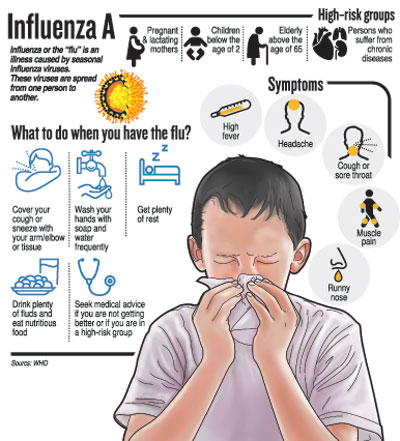News
It’s the flu, it’s not a new virus so don’t panic
Don’t panic – it’s the flu. Take precautions to prevent catching the flu and if you have the flu take steps not to spread it to others.
This is the strong advice on how to combat influenza from Consultant Epidemiologist Dr. Samitha Ginige when the Sunday Times contacted him on Thursday.
Confirming that the flu doing the rounds now has been identified predominantly as Influenza A by the Medical Research Institute (MRI) through numerous samples collected from the south, he dispels speculation that it is a “new” virus.
According to Dr. Ginige over the past 10 years, there is an annual outbreak of flu-like illness with the number of those affected being higher in some years and lower in others. Usually, these flu-like illnesses synchronize with the two monsoon seasons – the first peak occurring between May and July during the southwest monsoon and the second peak from November to January during the northeast monsoon. “It’s primordial or has been there for a long time.”
Any flu outbreak starts in ‘some’ place and this time it was the south, he says, explaining that last year it was in Kandy. The southern outbreak which began in the latter part of April and peaked in mid-May, seems to be on the decline, steadily and slowly, on the severity-aspect.
The usual signs and symptoms of the flu are:
- Runny-nose, fever, cough, sore-throat and aches and pains of the body
- In small children there could be diarrhoea and vomiting.
Stressing that because the flu is caused by a virus there is no specific medication and in healthy people whose immunity is good it is self-limiting, Dr. Ginige says that usually it wears off after about four-five days and only very rarely causes complications.
However, he underlines the fact that there are some high-risk groups who need to take extra-care. “They are more vulnerable in respect of getting complications when they catch the flu. So if they get flu-like symptoms it is advisable to consult a qualified medical practitioner,” he says, pointing out that then the doctor will be able to pick up the early signs of deterioration in the person’s condition and also complications. The rare complication of influenza is pneumonia.
The high-risk groups are:
- Children younger than 2 years of age
- Elderly above 65 years of age
- Both pregnant and lactating mothers because even after the delivery of a baby, the mother’s immunity is down.
- Those with chronic conditions and co-morbidities (other diseases) – heart disease, lung disease, kidney disease, other metabolic diseases and ‘uncontrolled’ diabetes. However, hypertension (high blood pressure) is not considered under the umbrella of factors leading to heart disease which could bring about complications if the person gets the flu.
- Those with immune-suppressing diseases or those taking medications which suppress immunity, such as cancer patients
Dr. Ginige insists that it is not only seeing the doctor that matters but also following medical advice.
| Make this your motto:“I should not get the flu and I should not spread it” | |
| Prevention is the best, Dr. Samitha Ginige keeps reiterating, giving measures that can be taken to stop the flu-bug getting to you. “There is a social responsibility to avoid public places if you have the flu. Don’t go to work if you are ill and if your child is sick, don’t send him/her to school as not only can the disease then spread to other children, it can also cause complications to your child,” he says, appealing to parents not to think of examinations and tuition classes but about the health of the child. Even if the child recovers from the flu quickly, keep him/her a few more days at home because the virus is still there. The child must have proper rest, he urges, as in the viraemia phase (when the virus is in the blood) if there is much exertion, there is a higher chance of complications. So it is always better to be safe than sorry. Another advantage of resting at home when a person or a child is ill, is that he/she can take “lots and lots” of fluids and nutritious food, leaving little room for complications and strengthening the immune system to fight back. Follow basic hygiene measures – at the top is frequent and thorough hand-washing with soap and water. He says men, women and children must take up the motto: “I should not get the flu and I should not spread it.” Profiling the flu, he says that it is spread through droplets from an infected person when he/she sneezes or coughs. These droplets carry a large concentration of the virus. Then a person who is standing in close proximity to the person who sneezes or coughs gets the full blast of the virus. The other mode of transmission is through contact – if a person with a runny-nose touches the secretions which will be full of the virus and then touches any surface (door-knobs et al) and another person touches the same surface and his/her face (eyes, nose and mouth which are the mucosal membranes) the disease will spread. This is why hand-washing with soap and water and not touching one’s face are vital, he says. “Whenever you use public transport, in school and in offices, wash your hands as a habit.” The other important measure is to resort to respiratory hygiene, according to Dr. Ginige. “Use tissues if possible and discard them not anywhere but into the bin and if you are using a handkerchief wash it frequently. When sneezing or coughing cover your nose and your mouth, not with your hands but with your inner elbow,” he adds, giving practical advice. (Please see ST 2 page 12) |

